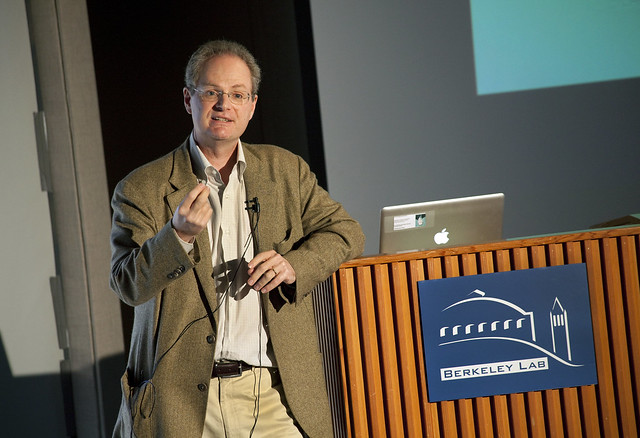.
Armand Paul Alivisatos is an American scientist of Greek descent, researching the structural, thermodynamic, optical, and electrical properties of nanocrystals. In 2009, he was named the Director of the Lawrence Berkeley National Laboratory.[1]
Alivisatos graduated with a bachelors in chemistry from the University of Chicago in 1981, and with a doctorate in physical chemistry from the University of California, Berkeley in 1986, where he worked under Charles Harris.
In 1986 he joined AT&T Bell Labs working with Louis E. Brus, and began research in the field of nanotechnology. He returned to Berkeley in 1988 as an Assistant Professor of Chemistry, becoming associate Professor in 1993 and Professor in 1995. He was Chancellor's Professor for 1998-2001.
In January 2003 he was appointed director of the Materials Sciences Division at the Lawrence Berkeley National Laboratory. He is also director of LBNL's Molecular Foundry. Alivisatos was elected a Fellow of the American Academy of Arts and Sciences in 2004.[2]
He is a Fellow of the National Academy of Sciences, American Physical Society and the American Association for the Advancement of Science, and is a co-editor of the scientific journal Nano Letters.
He has served as a member of the Defense Sciences Study Group, and on panels of the Defense Science Board. As of 2000, he was a member of the Department of Energy Council on Materials Sciences.
"Paul Alivisatos has been a world leader in the synthesis of artificial nanostructures and quantum dot technology, and one of the principal scientific drivers behind the use of nanoscience technologies to create a new generation of solar photovoltaic cells," Steve Chu said when he named Alivisatos as Berkeley Lab’s deputy director in 2008. He is the director of the Laboratory from 2009-present. [3] [4] He has been ranked 5th in the list of the 100 top chemists of the past decade released by Thomson-Reuters. [5]
Early Life
A. Paul Alivisatos was born in Chicago on November 12, 1959. He lived there until the age of 10, when his family moved to Athens, Greece, where he would remain through high school. Alivisatos has said of his years in Greece that it was a great experience for him because he had to learn the Greek language and culture then catch up with the more advanced students. "When I found something very interesting it was sometimes a struggle for me to understand it the very best that I could," he has said of that experience. "That need to work harder became an important motivator for me." Alivisatos returned to the United States to attend the University of Chicago in the late seventies. [6]
Awards
Presidential Young Investigator Award
Alfred P. Sloan Foundation fellowship
ACS Exxon Solid State Chemistry Fellowship
Coblentz Award (1994)
Wilson Prize at Harvard
Department of Energy Award for Outstanding Scientific Accomplishment in Materials Chemistry (1994)
Materials Research Society Outstanding Young Investigator Award (1995)
Department of Energy Award for Sustained Outstanding Research in Materials Chemistry (1997)
Notable Publications
Science vol 271 p 933, 1996
Science vol 295 p 2425, 2002
Science vol 310 p 5747, 2005
SCIENCE Vol 292 p2060 2001
External links
Biography (UC Berkeley)
References
^ About the Director-Berkeley Lab Archived 10 January 2009 at WebCite
^ "Book of Members, 1780-2010: Chapter A". American Academy of Arts and Sciences. Retrieved 14 April 2011.
^ About the Director-Berkeley Lab Archived 10 January 2009 at WebCite
^ Alivisatos Biography at Berkeley
^ Nature blog, Thomson-Reuters Top Chemists list
^ About the Director-Berkeley Lab Archived 10 January 2009 at WebCite
| Ancient Greece
Science, Technology , Medicine , Warfare, , Biographies , Life , Cities/Places/Maps , Arts , Literature , Philosophy ,Olympics, Mythology , History , Images Medieval Greece / Byzantine Empire Science, Technology, Arts, , Warfare , Literature, Biographies, Icons, History Modern Greece Cities, Islands, Regions, Fauna/Flora ,Biographies , History , Warfare, Science/Technology, Literature, Music , Arts , Film/Actors , Sport , Fashion --- |
Retrieved from "http://en.wikipedia.org/"
All text is available under the terms of the GNU Free Documentation License


